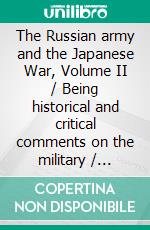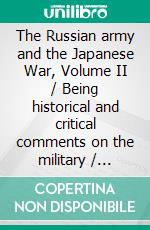The Russian army and the Japanese War, Volume II / Being historical and critical comments on the military / policy and power of Russia and on the campaign in the Far / East(Illustrated Edition). E-book. Formato PDF - 9788835351368
di Aleksei Nicolaevich Kuropatkin
edito da IONLINESHOPPING.COM , 2019
Formato: PDF - Protezione: nessuna
The Russo-Japanese War was fought during 1904 and 1905 between the Russian Empire and the Empire of Japan over rival imperial ambitions in Manchuria and Korea. The major theatres of operations were the Liaodong Peninsula and Mukden in Southern Manchuria and the seas around Korea, Japan and the Yellow Sea.
Russia sought a warm-water port on the Pacific Ocean for its navy and for maritime trade. Vladivostok was operational only during the summer, whereas Port Arthur, a naval base in Liaodong Province leased to Russia by China, was operational all year. Since the end of the First Sino-Japanese War in 1895, Japan feared Russian encroachment on its plans to create a sphere of influence in Korea and Manchuria. Russia had demonstrated an expansionist policy in the Siberian Far East from the reign of Ivan the Terrible in the 16th century.
Seeing Russia as a rival, Japan offered to recognize Russian dominance in Manchuria in exchange for recognition of Korea as being within the Japanese sphere of influence. Russia refused and demanded Korea north of the 39th parallel to be a neutral buffer zone between Russia and Japan. The Japanese government perceived a Russian threat to their plans for expansion into Asia and chose to go to war. After negotiations broke down in 1904, the Japanese Navy opened hostilities by attacking the Russian Eastern Fleet at Port Arthur, China, in a surprise attack.
Russia suffered multiple defeats by Japan, but Tsar Nicholas II was convinced that Russia would win and chose to remain engaged in the war; at first, to await the outcomes of certain naval battles, and later to preserve the dignity of Russia by averting a "humiliating peace". Russia ignored Japan's willingness early on to agree to an armistice and rejected the idea to bring the dispute to the Arbitration Court at The Hague. The war concluded with the Treaty of Portsmouth, mediated by US President Theodore Roosevelt. The complete victory of the Japanese military surprised world observers. The consequences transformed the balance of power in East Asia, resulting in a reassessment of Japan's recent entry onto the world stage. It was the first major military victory in the modern era of an Asian power over a European one. Scholars continue to debate the historical significance of the war.
Russia sought a warm-water port on the Pacific Ocean for its navy and for maritime trade. Vladivostok was operational only during the summer, whereas Port Arthur, a naval base in Liaodong Province leased to Russia by China, was operational all year. Since the end of the First Sino-Japanese War in 1895, Japan feared Russian encroachment on its plans to create a sphere of influence in Korea and Manchuria. Russia had demonstrated an expansionist policy in the Siberian Far East from the reign of Ivan the Terrible in the 16th century.
Seeing Russia as a rival, Japan offered to recognize Russian dominance in Manchuria in exchange for recognition of Korea as being within the Japanese sphere of influence. Russia refused and demanded Korea north of the 39th parallel to be a neutral buffer zone between Russia and Japan. The Japanese government perceived a Russian threat to their plans for expansion into Asia and chose to go to war. After negotiations broke down in 1904, the Japanese Navy opened hostilities by attacking the Russian Eastern Fleet at Port Arthur, China, in a surprise attack.
Russia suffered multiple defeats by Japan, but Tsar Nicholas II was convinced that Russia would win and chose to remain engaged in the war; at first, to await the outcomes of certain naval battles, and later to preserve the dignity of Russia by averting a "humiliating peace". Russia ignored Japan's willingness early on to agree to an armistice and rejected the idea to bring the dispute to the Arbitration Court at The Hague. The war concluded with the Treaty of Portsmouth, mediated by US President Theodore Roosevelt. The complete victory of the Japanese military surprised world observers. The consequences transformed the balance of power in East Asia, resulting in a reassessment of Japan's recent entry onto the world stage. It was the first major military victory in the modern era of an Asian power over a European one. Scholars continue to debate the historical significance of the war.
Ean
9788835351368
Titolo
The Russian army and the Japanese War, Volume II / Being historical and critical comments on the military / policy and power of Russia and on the campaign in the Far / East(Illustrated Edition). E-book. Formato PDF
Editore
Data Pubblicazione
2019
Formato
PDF
Protezione
nessuna
Punti Accumulabili


